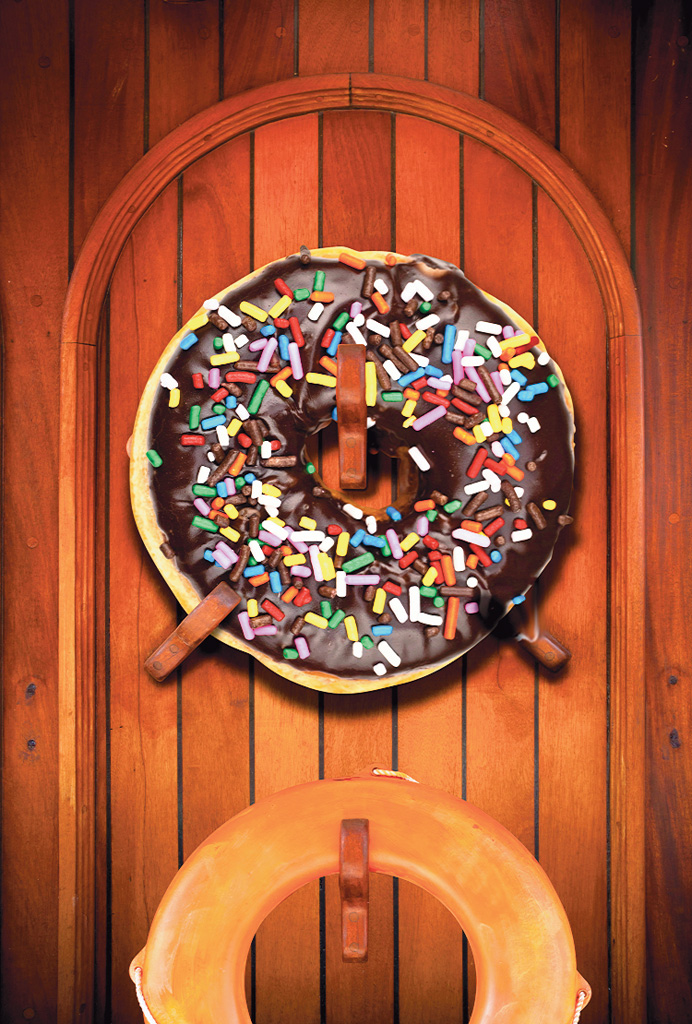When times get tough, many
people turn to junk food for comfort … but why?
By Jeff Schnaufer
CTW Features
If you find yourself reaching for a bag of chips or a candy bar to deal with the stress of the work, you really shouldn’t blame yourself. It’s just your inner hunter–gatherer looking for a little sustenance. Or maybe what you are really craving is some sweetness toward yourself.
“It’s our internal biological makeup that causes us to crave certain foods,” says James Colquohoun, the Santa Monica, Calif.–based co–author of “Hungry For Change: Ditch the Diets, Conquer the Cravings and Eat Your Way To Lifelong Health” (HarperOne, 2012). “It can come from financial stress, work stress or relationship stress or toxicity stress — all those stresses create a biochemical impact in the bodies and that causes us to create cravings.”
What is really interesting, Colquohoun says, is that for millennia we learned to crave fats and sugars.
“In our hunter gatherer days it was fats and sugars that helped us survive,” Colquohoun says. “Nowadays when we are stressed we have the same cravings for sugars and fats — it’s not fat from a bison or sugars from a sweet apple — it’s fast food or something.”
It’s this change in the modern “food landscape” that is to blame for our seeking out junk food and sweets when we get stressed out.
“Our cravings are not unnatural, they’re not to blame, but the modern food landscape that is to blame,” Colquohoun says.
Modern food may contain additives that are particularly addictive, Colquohoun says. One particularly addictive additive is monosodium glutamate — or MSG — which is found not just in Chinese and Japanese foods, but actually exists in up to 80 percent of modern processed food.
“You look at a packet of chips and it might say yeast extract — that contains MSG — that causes us to crave the last bit of chips out of the bottom of the bag,” Colquohoun says.
How can you combat such cravings in the modern food landscape?
“One of the best ways to overcome these cravings is to clean up the external environment,” Colquohoun says. “If you start adding nuts, seeds, herbs, sprouts, fermented foods, seaweeds, fruits and vegetables, you start to change your internal biochemistry. As you focus on adding more of them in the daily diet, you eventually push out the other foods. You can only eat so much food in a day. Your body starts to naturally crave the healthier foods.”
“If people want a short cut, it’s a green juice or a green smoothie,” Colquohoun says. “One of the recipes in our book is you make a juice with cucumber, celery, kale, parsley and then some lime or a little bit of apple or pear. If you drink that once a day, and people change nothing else, they’ll start to see that it will change their internal biochemistry and will start to impact their cravings.”
Diets are not a short cut, Colquohoun adds.
“If people are craving, a lot of people go onto a diet,” Colquohoun points out. “My recommendation is not to go on a diet. Focus on adding. It takes a lot of the neurosis out of the diet mentality. They can actually have a freer and longer lasting relationship with food.”
Geneen Roth agrees that diets are not the route to take to stop your cravings.
“I don’t believe in dieting. I believe it ultimately leads to shaming yourself and binging,” says the Berkeley, California-based author of “Women, Food and God: An Unexpected Path to Almost Everything” (Scribner, 2011).
Roth believes stress–related cravings occur for several reasons. First, “because we don’t want to feel what were feeling,” plus the obvious benefit that it tastes good. Also, if you are feeling overwhelmed, “you want some kind of comfort for that and turning to something that is instantly sweet is gratifying for some people.”
The problem with stress-related sweet and junk food cravings is the crash that comes after the initial sugar high or adrenaline rush.
“Now you’ve doubled your discomfort or suffering because you still have the same situation you had when you turned to food, but then you’ve also eaten and now you feel bad about the fact that you ate over it,” Roth says.
What you can do to conquer such sugary cravings is to give yourself “the sweetness you really need” in the form of caretaking, Roth says. For at least five minutes a day, make a list of all the good things in your life.
“In the brain, they’ve found out that the brain is Teflon for the good and Velcro for the bad,” Roth says. “A de-stressor right away is to sit down and focus on what the good things are in your life — you become calmer, your nervous system calms down — and you become more able to handle the situation.”
© CTW Features

